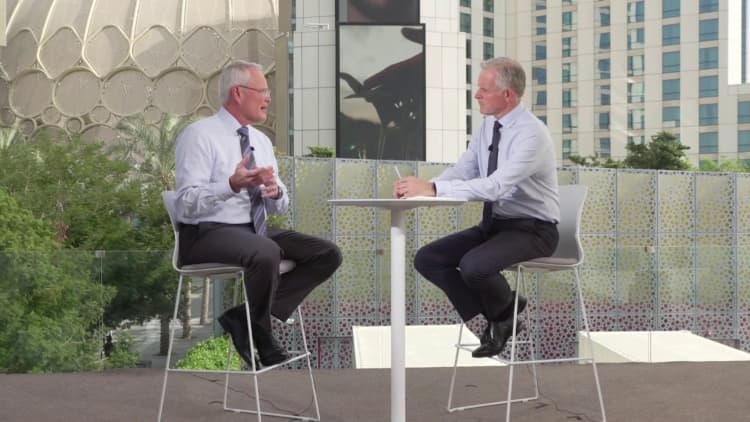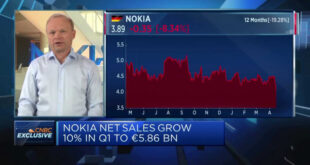Sultan al-Jaber, president of the UNFCCC COP28 climate conference, speaks during day two of the summit on Dec. 2, 2023 in Dubai, United Arab Emirates.
Sean Gallup | Getty Images News | Getty Images
Dubai, UNITED ARAB EMIRATES — A fight over the future of fossil fuels has been thrust into the global spotlight at the COP28 climate summit.
For nearly three decades, policymakers representing nearly 200 countries at the U.N.’s annual climate conference have failed to meaningfully address the chief driver of the climate crisis: the burning of coal, oil and gas.
Many gathering in Dubai for COP28 believe the talks can only be considered a success if they result in a deal to “phase out” all fossil fuels.
The language of the final agreement, expected by or around Dec. 12, will be closely monitored. A “phase out” commitment would likely require a shift away from fossil fuels until their use is eliminated, while a “phase down” could indicate a reduction in their use — but not an absolute end.
The outcome of COP28 must be that all the oil, gas and coal nations of the world see that now we are truly at the beginning of the end of the fossil fuel era for the world economy.
Johan Rockstrom
Director of the Potsdam Institute for Climate Impact Research
There’s also a debate about whether an agreement should center on “abated” fossil fuels, which are trapped and stocked with carbon capture and storage technologies. “Unabated” fossil fuels are largely understood to be produced and used without substantial reductions in the amount of emitted greenhouse gases.
Johan Rockstrom, director of the Potsdam Institute for Climate Impact Research and one of the world’s most influential Earth scientists, told CNBC that there is no doubt that COP28 “has to be the mitigation COP.”
“The outcome of COP28 must be that all the oil, gas and coal nations of the world see that now we are truly at the beginning of the end of the fossil fuel era for the world economy. And that we are now starting to bend the curve, properly,” he said.
“It is only that that will count whether COP28 is a success,” he continued. “Everything else will follow. So, of course, it is good to make progress on loss and damage, Article 6, financing, adaptation, nature, agriculture and water, but it is all following from whether or not we make progress on the fossil fuel phase-out.”
A draft text published in the early hours of Friday appeared to raise the prospect that world leaders could sign off on a deal that would “phase out” all fossil fuels. Other scenarios, however, include the option to “phase down” hydrocarbons, to only focus on coal — or to make no mention of fossil fuels whatsoever.
In this aerial view water vapour and exhaust rise from the steel mill of Salzgitter AG, one Europe’s largest steel producers, on November 22, 2023 in Salzgitter, Germany.
Sean Gallup | Getty Images News | Getty Images
Not everyone is on board with calls for a phase-out. Russia has said it would oppose this language being used in the final agreement, while COP28 host the United Arab Emirates has signaled its preference for a phase-down.
Big Oil, too, is pushing for a shift of focus away from calls to phase out fossil fuels. Exxon Mobil CEO Darren Woods told CNBC on Saturday that society should instead prioritize reducing emissions, which he described as the “true problem.”
‘This year is different’
In an unprecedented start to proceedings on Thursday, delegates at COP28 sealed the details of a landmark deal to help the world’s most vulnerable countries pay for the impacts of climate disasters.
The operationalization of the so-called loss and damage fund was hailed as a welcome breakthrough and helps to clear the way for policymakers to negotiate on other major issues.
“Now we don’t have an agenda fight [and] we don’t have a loss and damage fight, it opens up a space for us to have a big fossil fuel fight,” said Catherine Abreu, founder of the Destination Zero network of nonprofits working on climate issues. “[It is] important to say that more fossil fuels equal more loss and damage, so these two issues are actually quite intertwined.”

Abreu told CNBC that she previously wrote about the importance of finally “saying the F-words” at the U.N.’s annual climate conference, arguing that “just a few years ago talking about fossil fuels within the climate convention was invisible, basically.”
Notably, at last year’s COP27 conference in Egypt, more than 80 countries supported a fossil fuel phase-out commitment in the final agreement. The call ultimately failed to gain enough support, but it appeared to reflect growing momentum to recognize fossil fuels the largest contributor to climate change.
Abreu partly attributed the COP27 defeat to parties not being organized enough to win that particular battle.
“This year is different,” she said. “We’re actually seeing that parties are very organized on this front, coming into COP28. So, we have seen in almost every multilateral event that’s taken place in 2023 a huge conversation about the pace and scale of the energy transition.”
“Over the next couple of weeks, we’re going to be seeing parties negotiating this landing zone of how the energy transition package gets articulated in the final outcomes of COP28,” Abreu said.
‘A firehose of fossil fuels’
A flurry of COP28 announcements on Saturday sought to help decarbonize the energy sector, with nearly 120 governments pledging to triple renewable energy capacity by 2030. Other initiatives launched over the weekend included sizable blocs committing to expand nuclear power and slash methane emissions.
For the U.N. chief, however, preventing the worst effects of the climate crisis hinges on stopping the burning of fossil fuels outright.
“We cannot save a burning planet with a firehose of fossil fuels,” U.N. Secretary-General António Guterres said Friday, as he addressed world leaders in Dubai.
“The 1.5-degree limit is only possible if we ultimately stop burning all fossil fuels. Not reduce. Not abate. Phase-out — with a clear timeframe aligned with 1.5 degrees.”
The 1.5 degrees Celsius (2.7 degrees Fahrenheit) temperature threshold is widely recognized as crucial because so-called tipping points become more likely beyond this level. Tipping points are thresholds at which small changes can lead to dramatic shifts in Earth’s entire life support system.
 EU News Digest Latest News & Updates
EU News Digest Latest News & Updates


